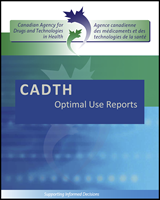Except where otherwise noted, this work is distributed under the terms of a Creative Commons Attribution-NonCommercial-NoDerivatives 4.0 International licence (CC BY-NC-ND), a copy of which is available at http://creativecommons.org/licenses/by-nc-nd/4.0/
NCBI Bookshelf. A service of the National Library of Medicine, National Institutes of Health.
Atypical Antipsychotics for Schizophrenia: Combination Therapy and High Doses — Project Protocol [Internet]. Ottawa (ON): Canadian Agency for Drugs and Technologies in Health; 2011 Aug. (CADTH Optimal Use Report, No. 1.1.)

Atypical Antipsychotics for Schizophrenia: Combination Therapy and High Doses — Project Protocol [Internet].
Show detailsOptimizing drug-related health outcomes and the cost-effective use of drugs is a goal of the Canadian Agency for Drugs and Technologies in Health (CADTH). Where possible, CADTH builds on existing applicable Canadian and international initiatives and research.
CADTH goals are achieved through three main approaches:
- identifying evidence-based optimal use in the prescribing and use of specific drugs
- identifying gaps between clinical practice, then proposing evidence-based interventions to address these gaps
- supporting the implementation of these interventions.
Direction and advice are provided to CADTH through various channels, including the following:
- the former COMPUS Advisory Committee (CAC) and the former Advisory Committee on Pharmaceuticals (ACP), which include representatives from the federal, provincial, and territorial Health Ministries and related health organizations.
- the Drug Policy Advisory Committee (DPAC)
- the DPAC Optimal Use Working Group (OUWG))
- DPAC and its OUWG were formed following the selection of this report’s topic.
- the COMPUS Expert Review Committee (CERC) stakeholder feedback.
1.1. The COMPUS Expert Review Committee
CERC consists of eight Core Members appointed to serve for all topics under consideration during their term of office, and three or more Specialist Experts appointed to provide their expertise in recommending optimal use for one or more specific topics. For topics in the area of mental health, four specialists were appointed as Specialist Experts. Two of the Core Members are Public Members who bring a lay perspective to the committee. The remaining six Core Members hold qualifications as physicians, pharmacists, or health economists, or have other relevant qualifications, with expertise in one or more areas such as but not limited to: family practice, internal medicine, institutional or community clinical pharmacy, pharmacoeconomics, clinical epidemiology, drug utilization expertise, methodology, affecting behaviour change (through health professional and/or patient and/or policy interventions), and critical appraisal. The Core Members, including Public Members, are appointed by the CADTH Board of Directors.
The mandate of CERC is advisory in nature, and consists of providing recommendations and advice to CADTH on assigned topics that relate to the identification, evaluation, and promotion of optimal practices in the prescribing and use of drugs across Canada. The overall perspective used by CERC members in producing recommendations is that of public health care policy-makers in pursuit of optimizing the health of Canadians within available health care system resources.
- INTRODUCTION - Atypical Antipsychotics for Schizophrenia: Combination Therapy an...INTRODUCTION - Atypical Antipsychotics for Schizophrenia: Combination Therapy and High Doses — Project Protocol
Your browsing activity is empty.
Activity recording is turned off.
See more...